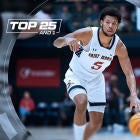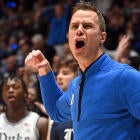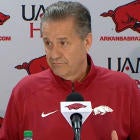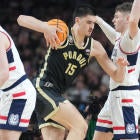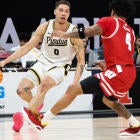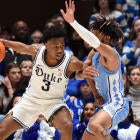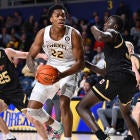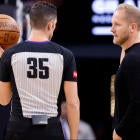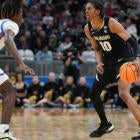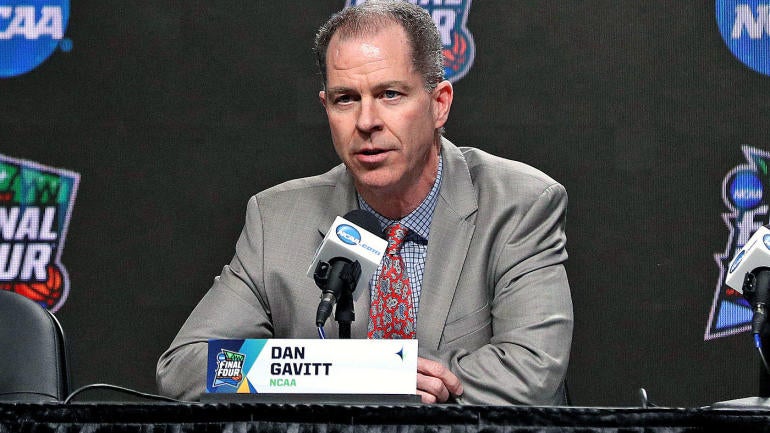
The NCAA on Tuesday announced the schedule for the 2021 NCAA Tournament, which will be modified somewhat from its usual template due to precautions built in regarding the coronavirus.
On Tuesday evening, CBS Sports talked with NCAA senior vice president of basketball Dan Gavitt to follow up on what big decisions still await in advance of March, what things still can't be disclosed publicly yet, and if we will still have an in-season, one-time-only top-16-seeds bracket reveal in February. The interview has been condensed and edited for conciseness.
CBS Sports: In regard to the NCAA COVID Advisory Board and Marion County health officials, why is starting with the First Four on the Thursday after Selection Sunday considered a sufficient enough amount of time after arrival into Indianapolis?
Dan Gavitt: Well, it's based on the seven days of testing before teams even arrive, or else it wouldn't work. But because there's seven daily tests required before even arriving in Indianapolis, it creates a long enough time period.
CBS: Since the NCAA is, as always, going to afford teams charter flights or charter buses, is the travel aspect of this not considered as sizable a risk when it's added into the equation of everything that's going to have to happen to get the tournament going?
DG: No, not given the way teams will be required to travel. They will have to travel with six feet of spacing, whether it's in an aircraft or a bus, and be masked, and no eating or drinking at all while traveling.
CBS: Will the committee rank beyond the usual 1-68 seed list, into the 70s, in the event you need to have backup teams, should certain selected teams not be able to play in the tournament? Specifically, between from when the bracket is revealed on Selection Sunday and by the start of the first round?
DG: Not determined yet. Now, we always announce who the last four out are, so we'll still do that because those will be the No. 1 seeds in the NIT. But it's undetermined whether there will be backup teams for the [NCAA Tournament].
CBS: Is there anything you can provide right now in regard to having to work around potential forfeits? Has that been heavily discussed by the committee at this point, or is it a major factor that, now that you've got the dates out there, you're really going to burrow more into in the coming week or so?
DG: The latter. The staff's done some scenario-planning, but we haven't gotten deep on it with the committee on it yet.
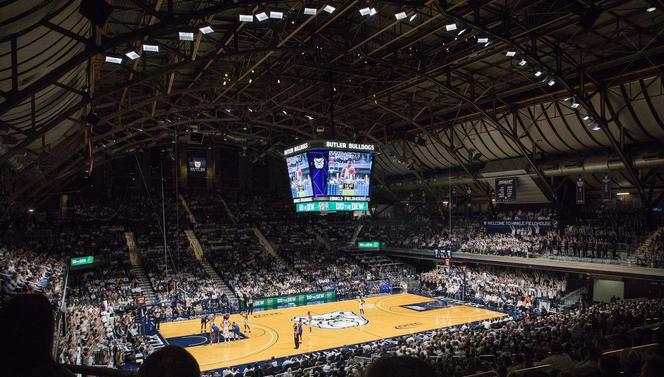
CBS: The First Four at Mackey Arena and Assembly Hall. Why those two as opposed to Hinkle and Indiana Farmers Coliseum?
DG: The fewest number of games will be played at Assembly Hall and Mackey in the first round. So, we have a scenario where, with 68 teams, we need to have as much time as possible that week to provide practice time in the venues. And if we were to play the First Four games at venues other than Mackey and Assembly Hall, it would take significant practice time away from venues that are going to host more games. So it's a practical matter as much as anything.
CBS: So, teams will be practicing, in addition to the Indiana Convention Center, they will have the basketball venues and Lucas Oil available to them for practice?
DG: Yes. But we're still working on scheduling because it's very complicated as you can imagine with 68 teams. But yeah, we need to have as much available time as possible. And even with that we're gonna have practice times throughout the entire day.
CBS: And just to be clear, if Indiana makes the First Four it's obviously going to have to play at Mackey, and if Purdue makes it, it's going to have to play it Assembly Hall?
DG: Correct, yes. The same also holds true if Butler makes it or IUPUI makes it, they won't play at their home venue.
CBS: But the committee will not go as far as to keep non-home Big Ten teams out of Big Ten venues or non-Butler Big East teams not playing in Hinkle?
DG: Correct.
CBS: In this unique tournament, why did the committee opt to stick to the usual First Four protocol when you've got an extra at-large this year? Why not afford all low-major teams, who are struggling through this season as much as anyone, why not just give all 16 seeds the courtesy of automatically starting in the first round and not subject them entrance into the main bracket via the First Four? Since all First Four games are on one day, you could even argue that on that Thursday you would bring more enticement from a television standpoint by putting in eight at-large teams from traditional power conference programs.
DG: Unless there was a very compelling reason to go away from the normal format, the committee wants to maintain as much normalcy as possible. We honestly, we didn't consider that -- we had bigger fish to fry. I think I can probably speak for the committee on this: it's gonna be hard to do this tournament with the model that we're used to. Making change just for change's sake only creates more complications. We're trying to limit complications, right? It's a reasonable question to ask, but it's not the kind of level of detail that we've been focused on, because the complexity of this enterprise endeavor is so massive that having some normalcy is something that we embrace.
CBS: What was the committee's thought process for the venues selected in this way: Sweet 16, the two basketball venues, Hinkle and Bankers Life, and then with the Elite Eight and the Final Four specifically going to Lucas Oil?
DG: Well, we were very fortunate. The initial plan was to have Bankers Life only available for the first and second rounds because, as you know, the Pacers have to give up the building. And that was our ask. When we started to get closer to finalizing the overall schedule and knew that the regionals would be on Saturday and Sunday, we went back to the Pacers and asked if there's any way possible to get their building on two consecutive weekends. And being the incredible partners in the community they are, they granted that request. So once we knew we had Bankers Life for the Sweet 16 games, the committee and staff determined that Hinkle was the other optimal venue for that round. And we only could get Bankers Life for Saturday and Sunday. So then we had to make a determination as to where to put the Elite Eight games. We wanted to make sure that everybody that plays in the Final Four will have played at least one game in Lucas Oil. So that's how we got to Elite Eight games in Lucas Oil.
Itching for more college hoops analysis? Listen below and subscribe to the Eye on College Basketball podcast where we take you beyond the hardwood with insider information and instant reactions.
CBS: Was there any consideration given to flipping it and saying, since we can't have a full building with fans, why not have a traditional basketball venue host the championship? So maybe the Pacers use Bankers Life for the middle weekend, the regionals, and we would use it on weekends one and three as opposed to weekends one and two? Was that at least debated amongst the committee?
DG: No.
CBS: And it was the Pacers' decision more than the NBA? Because the NBA has to make the schedule, so how does that logistically work? The Pacers don't get to decide when they play games, right?
DG: No, but the NBA has not announced the second half of the schedule, and so teams have the opportunity to give their available dates. They had to give the dates to the NBA, assumedly blocking out those days, so the NBA won't give them games on days when we'll be in there.
CBS: You mentioned every team getting an opportunity once they get to the Final Four to have played Lucas Oil at least once. Will the court structure and layout at Lucas Oil change once you reduce it to one court for the Final Four, or even the Elite Eight, vs. how it's going to be set up for the first weekend?
DG: We're still working on all those logistics. I can tell you the building is not going to be turned into where the court is in the middle of the stadium.
CBS: Any current projections from Marion County health officials about fan capacity at Lucas Oil? The Colts had it at 10% for their final home game. The hope is that there can be at least some sort of capacity in there that can be close to what the Indianapolis Colts were afforded.
DG: Well, we're going to make a determination in early February. It'd be premature to say anything until then.
CBS: How many teams do you anticipate will arrive prior to Selection Sunday, being the Friday or Saturday before? For example, teams considered objective locks. Let's say Baylor doesn't win the auto bid, but it's obviously making the tournament. With logistics in mind and not wanting all teams get there on Monday, if you don't have to do that, would there be almost an official acknowledgement from the committee in advance of the bracket reveal? Why should we make Baylor wait around until Sunday night to travel when we know what's going to be in the field?
DG: Yeah, it's premature to comment on that, but at the appropriate time we will.
CBS: We have the locations, the venues and the dates. What big decisions come next?
DG: That's a good question. I mean, it's probably a series of more details than the real large items. There's a couple I can think of, but again it's premature to comment on them, because we haven't shared or had enough consideration with committee and even with the membership. One of the big things that's going to have to happen over the subsequent weeks here is communicating and orienting schools and conferences with how this is going to work. Helping them to prepare for what's going to be great, but a different experience, so they can be prepared. We all know most programs in some way, shape or form operate -- especially down the homestretch of the season -- with NCAA Tournament practices and policies in practice, right? So that when they get to the tournament, it's not a totally foreign experience. Everybody's having to operate differently this year with COVID, but there will likely be some things that will be different even than what has been going on in the regular season -- or will have to just be kind of re-emphasized to be disciplined about during the tournament. Communicating that and making sure a coaches, administrators and players know, so there aren't any surprises. That will be important.
CBS: Is the communication and re-emphasis on diligence about mask-wearing during games going to be one of those action items?
DG: Yes, likely. Yep. You know, it's everything. It's social distancing, it's mask-wearing, it's all the things that we're all having to do. And if you're gonna have 68 teams together for 17 days to determine a national champion, everybody has got to be in this together, right, because everybody could impact someone else. It's teams, it's referees it's you-name-it. Making sure everybody understands what has to happen and how disciplined everyone has to be to be successful is going to clearly be part of the message.
CBS: So, broadly, can you address this overall objective: By the time we get to the start of the tournament, can you say that the NCAA will be prepared to adjust as necessary? Meaning fill in the bracket as necessary, if forfeits are unavoidable, and still be able to field a full tournament, despite any curveballs that the virus may dictate?
DG: Again, we're still working through contingency planning and scenario planning, so it's premature to directly answer that question.
CBS: And one more: Is there a plan to do a mid-season top 16 reveal like usual in February?
DG: Yes, and it will be on CBS as always. Right on the weekend of Feb. 13.













